ROBERT WILLIAMS BUCHANAN (1841 - 1901)
|
ROBERT WILLIAMS BUCHANAN (1841 - 1901) |
|
|
|
|
|
|
|
|
THE OUTCAST |
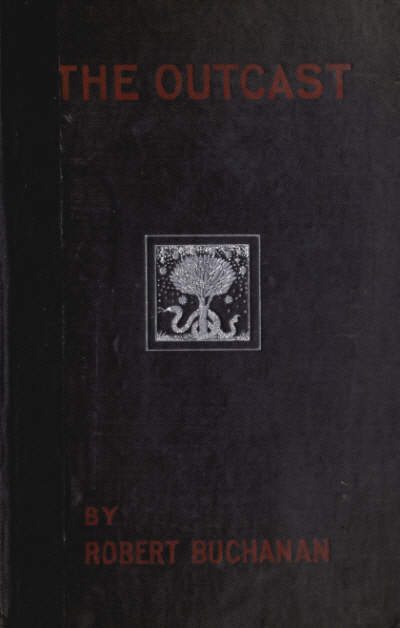 |
|
THE OUTCAST |
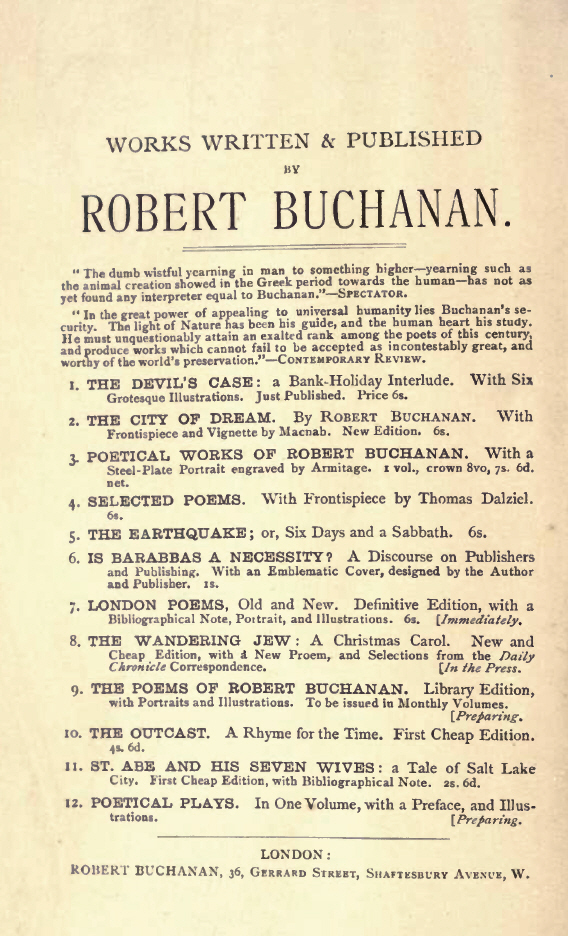 |
|||
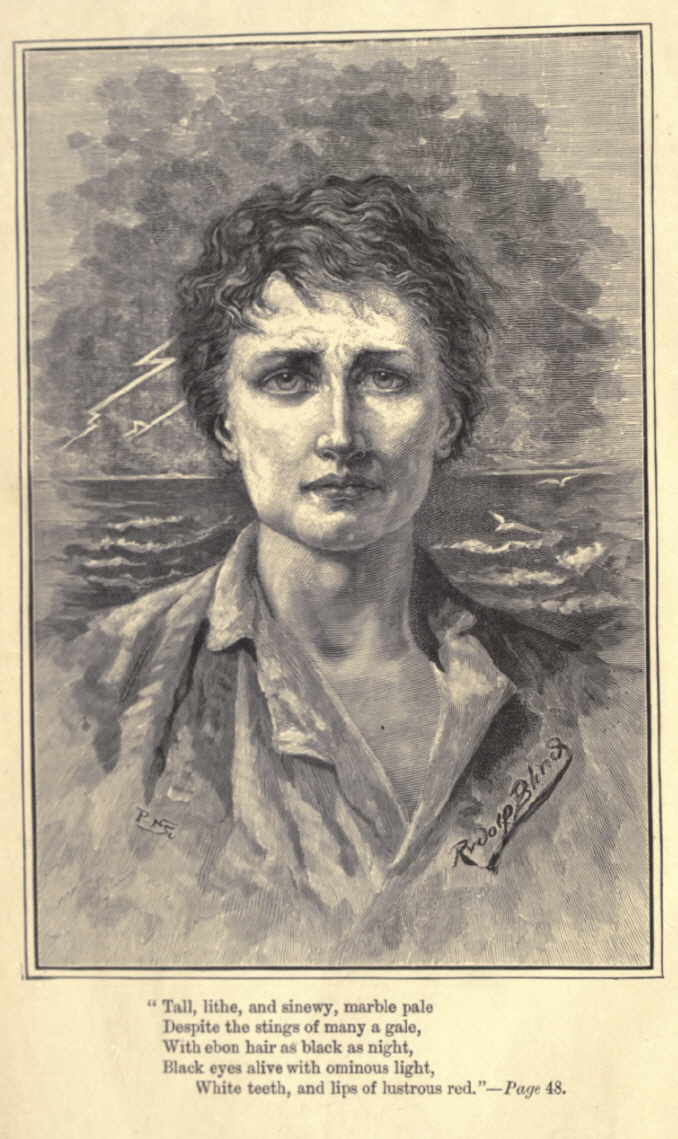 |
|||
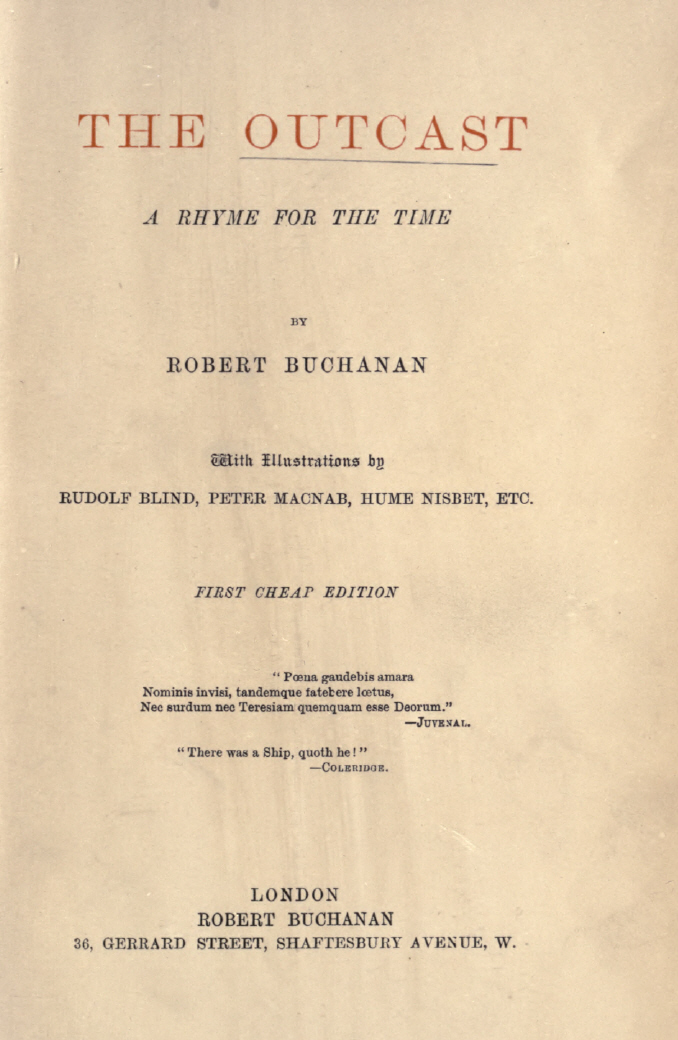 |
|||
|
THE OUTCAST A RHYME FOR THE TIME
BY ROBERT BUCHANAN
With Illustrations by RUDOLF BLIND, PETER MACNAB, HUME NISBET, ETC.
FIRST CHEAP EDITION
“Pœna gaudebis amara “There was a Ship, quoth he!”
LONDON
CONTENTS. _____
PAGE |
|
|
|
|
*** The present volume contains the first of a series of poetic tales
vii PREFACE.
“THE OUTCAST,” issued to the public in 1891, was the first of what I may describe as my “Satanic series,” the most recent of which was “The Devil’s Case.” I use the word “Satanic” to express the spirit of moral and intellectual revolt, which is just as absolute in Vanderdecken as in the greater Devil. The same unrest and unhappiness, the same dissatisfaction with the Divine plan, the same appeal to Nature against God, emerge in both characters; Vanderdecken, indeed, is the stormy child of the Spirit of Pity. When the work is complete, it may be discovered that neither the Devil nor his favourite pupil has the last word, after all. ROBERT BUCHANAN.
[Notes: “You will rejoice in the bitter punishment The second quotation is from the third verse of Coleridge’s ‘The Rime of the Ancient Mariner’. ___
Following W. E. H. Lecky’s extravagant praise of The City of Dream in his speech at the Royal Academy Banquet in May 1888, Robert Buchanan embarked on the long process of buying back the copyrights of his poetry from Chatto & Windus. His obvious intention was to set himself up as his own publisher and the first book was to be The Outcast. On 14th December, 1889, an item in The Academy stated: ‘MR. ROBERT BUCHANAN’S new poem, to be published immediately, with illustrations, is entitled The Outcast: a Rhyme for a Time. It is described as a somewhat new departure in poetry, intermingling with a legendary subject a good deal of contemporary matter. The hero is that mythical person, “The Flying Dutchman,” whom the poet assumes to be still existing, and who in the prelude (called “The First Christmas Eve”) makes his appearance in the heart of London.’ Buchanan’s main occupation at this time was as a playwright and, following a string of successes at the Vaudeville Theatre, his financial position was probably the best it had ever been. However, despite further success with G. R. Sims at the Adelphi, Buchanan also had failures, notably The Bride of Love, and on 2nd March, 1891, Buchanan wrote to Andrew Chatto, regarding the next payment due for his poetical copyrights: “A sudden whirlwind of demands prevented me meeting the £150, which I thought was due some weeks later. I will, however, see to it without delay—unless you are agreeable to place it to the credit of the Outcast’s first 1000 copies. I find the book will cost me far more than I expected, & what with sums to artists, engravers &c. I am much out of pocket– Suppose you made me a clear deal for the 1st edition, delivered complete into your hands? The book is now ready, & all the pictures completed save one—a head by Rudolf Blind (and a very fine one) of the Hero, to serve as frontispiece. At the rate of half price per copy, the nett price being 8/-, the amt for the 1000 would be £200, but there would of course be a certain number out of that of review-copies & odd numbers in dozens.” Chatto accepted a revised version of the deal and the first edition of The Outcast was published by Chatto & Windus in the autumn of 1891. The Times reviewed the book on 3rd September and deemed it “a very mediocre performance.” |
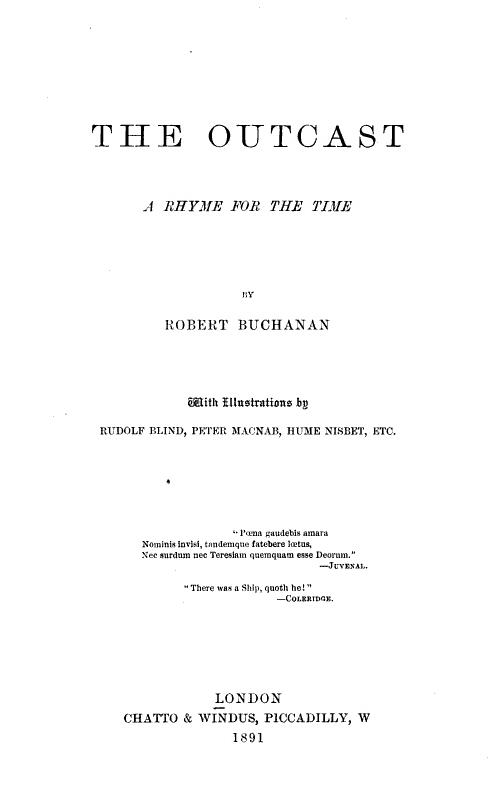 |
|
[Title page of Chatto & Windus edition.]
When Buchanan finally set himself up as his own publisher in 1896, he re-issued The Outcast and it is this later version which is transcribed on this site. Like The Earthquake, it is an incomplete work, since Buchanan never published (and presumably never wrote) the promised sequels. This was Buchanan’s third attempt to deal with the story of the Flying Dutchman. In 1878 he had written a play with that title for Hermann Vezin which was never produced, and his 1883 novel, Love Me Forever, also involves the myth. Buchanan dedicated The Outcast to Charles Warren Stoddard, the American author of South Sea Idyls (1873). There is a lot of information about Stoddard online and much of his correspondence with other authors has survived. In the archives of the University of Notre Dame, Stoddard’s correspondence with Father Hudson contains several mentions of Buchanan. On 25th January, 1889, Stoddard writes (from Munich) that “He has had some letters from Robert Buchanan.” On 14th November 1891, that “He never did see Robert Buchanan.” On 8th December 1891, Stoddard “has a jolly letter from Robert Buchanan, a copy of which he will send soon.” Which is presumably the copy enclosed in a letter of 27th December, 1891, which is described as follows: ‘Buchanan sends his "Outcast" along with the picture Stoddard asks for and some other books of his. Stoddard will notice that in "Outcast" Buchanan has treated him as a real friend and borrowed some phrases and ideas. He is sorry he missed Stoddard while he was in London. The autobiography Stoddard speaks of would be a morsel for the gods. Buchanan would be grateful if Stoddard would send something for the new review he is floating. R(obert) L(ouis) Stevenson has been sending from Samoa sketches of the South Sea Islands, which beside Stoddard's divine idyls look like dingy photographs. The life Stoddard describes is godlike.’ On 26th November, 1894 Stoddard writes ‘Just received a letter from Robert Buchanan. He proposes to review "Lazy Letters" in London. If the "Lepers" and the brief paper written after the death of Father Damien could be added, the volume would possess more value than the miserable American edition.’ On 4th November, 1902, Stoddard proposes writing a sketch ‘to be called “The Island of Song”, which will include several of the letters written by Robert Buchanan to Stoddard.’ As far as I know this never appeared, and a final letter in the archive, from 9th April 1904, includes the following: ‘Perhaps this summer Stoddard may be able to write a sketch of Robert Buchanan.’ Buchanan is also mentioned in Roger Austen’s 1995 biography of Stoddard, Genteel Pagan: The Double Life of Charles Warren Stoddard: Page 115: “I never bowed, but to superior work, Buchanan had achieved notoriety in England by attacking D. G. Rossetti and “The Fleshly School of Poetry,” but it was his views on American literature that endeared him to Stoddard. Buchanan held that Whitman was one of the greatest poets of the century. (By contrast, Howells and James were effeminate “man-milliners.”) Buchanan also decried the American neglect of Melville and of Stoddard himself.’ p. 185:
Back to Poetry
|
|
|
|
|
|
|